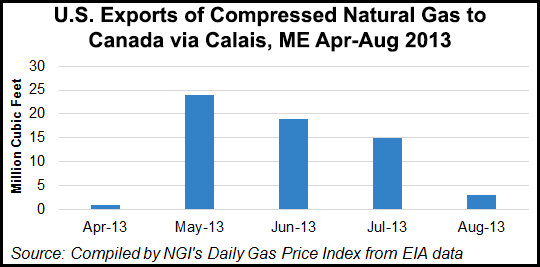Infrastructure | NGI All News Access
Maine Hospital Opens Valve to CNG Service
The Cary Medical Center in Caribou, ME, will start 2014 running primarily on compressed natural gas (CNG) from Xpress Natural Gas (XNG) following a recent valve-turning ceremony at the hospital, which had previously used heating oil.

The fuel switch is expected to save Cary $250,000 annually and lessen the 65-bed acute care hospital’s carbon footprint.
In early 2013, home heating products retailer Dead River Co. said it would sell and supply CNG to commercial and institutional customers in central, northern and eastern Maine from XNG’s CNG terminal in Washington County, ME (see Daily GPI, Jan. 31, 2013).
New England power generators as well as residential and commercial heating customers are increasingly turning to lower-priced natural gas, but construction of new pipelines just to serve winter peaking is not economic. With no recourse to storage, growing numbers of off-pipe customers in some areas are receiving natural gas via “virtual pipelines” — CNG or liquefied natural gas trucked in on tractor-trailers (see Daily GPI, Nov. 22, 2013).
Boston-based XNG said it is rapidly expanding both its operational capabilities and service footprint. XNG, which has customers under contract for service in five U.S. states and the Canadian Maritime, said it is the only provider licensed to export trucked CNG by the U.S. Department of Energy and licensed to import trucked CNG by the National Energy Board of Canada.
U.S. Energy Information Administration (EIA) data show very little CNG export activity from the United States to Canada to date, and all the activity on record has been classified as leaving the country via Calais, ME. According to the EIA data, CNG exports to Canada from the United States began in April 2013 and averaged just 12.4 MMcf per month through August.
© 2024 Natural Gas Intelligence. All rights reserved.
ISSN © 1532-1231 | ISSN © 2577-9877 |
